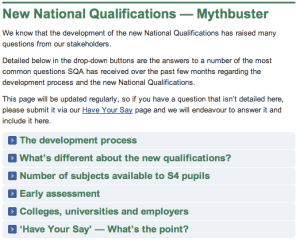Getting to know the E’s and O’s
I know, I know. The experiences and outcomes have been around for ages now. Surely we’re long past getting to know them? In my experience however, this simply isn’t the case. Many of us seem to have taken something from them first time through, but now that we’re approaching the blunt end of assessment and reporting we’re beginning to wonder if we got them right.
Through our work with Myra Young, we’re being encouraged to take another look at the experiences and outcomes – this time starting with the purpose. This can often lead to a quite different approach to planning. Rather than looking at the experiences and outcomes and jumping straight to the activities we’d carry out, we think first about what the purposes of the outcomes are in terms of learning, how this could be evidenced and what the success criteria are.
On our inservice days next week at my new school, we’re lucky enough to be receiving CPD from teachers at Cramlington Learning Village with a view to planning our lessons using the accelerated learning cycle. But first I’m going to suggest that we need to ensure we understand the curriculum before jumping into detailed collaborative planning of lessons based on the learning cycle.
This can be illustrated with one of our science experiences and outcomes. Whilst in the past this might have led to us planning a series of lessons covering all the various organs of the systems we feel we need to ‘cover’, a fresh look at the purpose of the learning outlined in the curriculum brings a different emphasis and therefore quite different lessons.
We often complain the experiences and outcomes are vague and complex (which they are…but do we really want a version of the National Curriculum instead?) but if they are how can we expect to be fully familiar with them already? As difficult as it is to accept from the perspective of development work (which is going to get worse when the new NQs start arriving), the reality is that our understanding of the curriculum is going to evolve over time and I’m doing my best to try to keep my mind open to that…
Cross-posted on Fearghal Kelly’s thoughts

